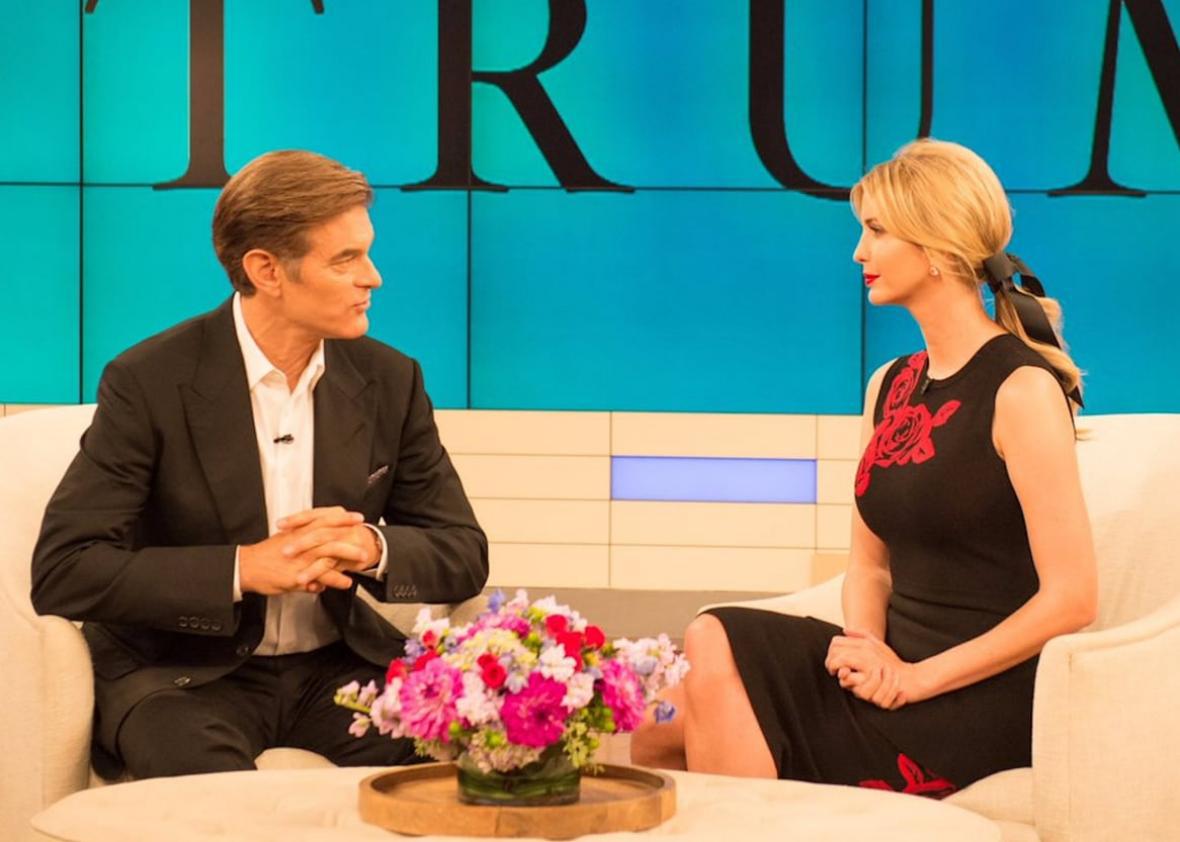Postpartum depression is a potentially serious condition with symptoms that can range from anxiety and irritability to panic attacks, suicidal impulses, and a feeling of detachment from one’s newborn. The condition affects about one in 9 women, according to the CDC.
But it’s hard not to feel a bit wary of the way in which Ivanka Trump revealed her own PPD struggle on Thursday’s episode of the syndicated Dr. Oz Show. “With each of my children, I had some level of postpartum depression,” Trump told Oz, perched on a white armchair in front of a studio audience. “It was a very challenging emotional time for me because I felt like I was not living up to my potential as a parent or as an entrepreneur and executive.” The interview was taped Monday.
The conversation included other tidbits, including Trump’s insistence that she doesn’t view it as her role to be a “voice of moderation” in her father’s administration. But the PPD reveal was the one that made headlines. It’s not clear from early clips whether Trump was formally diagnosed with PPD, or whether she self-diagnosed in retrospect. (The so-called “baby blues” are distinct from PPD, and much more common.)
There’s an interesting kernel in this otherwise anodyne bit of puffery from the land of Oz. The Dr. Oz “reveal” felt like evidence of Ivanka’s greatest talent: recognizing when a topic is innocuous enough that she can safely use it to build her personal brand at no risk to her reputation. She is against human trafficking and racism. She is in favor of “empowerment” and working women. When it comes to politics, she thinks whatever you do. “Like many of my fellow millennials,” she told the Republican National Convention, “I do not consider myself categorically Republican or Democrat.” In June, she told Fox & Friends, “I try to stay out of politics.” Her views on controversial topics like abortion remain unknown, and her supposedly progressive beliefs on topics like climate change remain publicly unspoken.
In light of that, the revelation of her postpartum suffering makes perfect sense. It was once taboo for role-model mothers to talk about PPD, regarded as a confession of weakness or unnaturalness. But it has now become a mainstay of women’s magazines and tabloids. Adele, Bryce Dallas Howard, Chrissy Teigen, Gwyneth Paltrow, and Drew Barrymore are just a few of the many celebrities who have revealed their diagnoses in interviews. In the real world, there remains an intense stigma attached to mothers who are consumed by negative emotions in the early weeks and months of motherhood. In the glossy realm, though, 12 years after Brooke Shields published a breakthrough memoir about the topic, talking about PPD is no longer controversial at all.
It’s surely a good thing that another high-profile woman is discussing her postpartum depression in the public sphere. Still, it’s striking how canny Ivanka’s instinct is for feeling out when an issue has become so uncontroversial that discussing it imposes no cost on her. If she’s determined that her struggles with difficult feelings in the wake of childbirth is worth discussing on daytime television, it likely means she is confident that no one will judge her harshly for it. If only women who don’t get invited on the Dr. Oz Show had the luxury of feeling that way, too.
